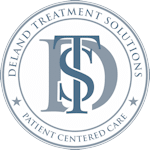Written by DeLand Treatment Solutions, Medically Reviewed by Deland Treatment
March 11, 2024
What are the Available Treatment Options for Schizophrenia?
Schizophrenia, a severe mental illness, can significantly affect a person’s ideas, feelings, and behaviors, making the world appear complex and overwhelming. Although there is no cure for schizophrenia, there are various effective treatment options available to help manage symptoms, improve quality of life, and support recovery.
Our treatment for schizophrenia includes drug-based and non-drug treatments. At DeLand Treatment Solutions, we provide care and information about these treatments, as well as hope and advice to help you cope.
If you need treatment for schizophrenia, please feel free to contact us at (386) 866-8689.
Signs of Schizophrenia
Schizophrenia is a serious mental illness that affects the way a person thinks, feels, and behaves. It can be a very challenging condition, but with treatment, people with schizophrenia can live full lives.
Here are some of the most common symptoms of schizophrenia:

Positive symptoms:
These are traits that add something to a person’s experience, such as:
Hallucinations: Seeing, hearing, smelling, tasting, or feeling things that do not exist. Auditory hallucinations, such as hearing voices, are the most common type of hallucination in schizophrenia.
Delusions: False beliefs that are not based on reality. For example, someone with schizophrenia may believe that the government is persecuting them or that they have superpowers.
Disorganized thinking and speech: This may make it difficult for the person to follow conversations or understand their thoughts.
Negative symptoms:
These are symptoms that take something away from a person’s experience, such as:
Apathy: Lack of interest or motivation.
Aversion: Difficulty starting or completing a task.
Anhedonia: Inability to experience pleasure.
Flat affect: lack of emotional expression.
It is important to note that experiencing certain symptoms does not necessarily mean that an individual has schizophrenia. These symptoms can also be present in other mental illnesses such as bipolar disorder or depression. If you are worried about yourself or someone you know, it is advisable to seek professional help.
Treatment Options for Schizophrenia
As stated earlier, individuals suffering from schizophrenia have a variety of treatment options available. These treatments can be divided into two categories: drug-based therapy and non-drug therapy.
Drug-based Treatment
Medication is often the first line of therapy for schizophrenia and is beneficial in reducing symptoms such as hallucinations, delusions, and disorganized thinking. Antipsychotics are the most widely prescribed medications for schizophrenia, and they work by targeting certain neurotransmitters in the brain to restore balance and reduce symptoms.
However, it is important to remember that determining the appropriate medication and dosage may take time and may need to be changed as therapy progresses.
Non-drug Treatment
In addition to drug-based therapy, non-drug treatments may also be beneficial for controlling schizophrenia symptoms. These treatments attempt to meet the psychological, social, and emotional needs of the individual while also supporting a holistic healing approach. Non-drug therapy may include the following:
- Psychotherapy- This type of treatment in which patients communicate with a mental health professional to acquire coping techniques and gain information about their condition.
- Cognitive-behavioral treatment (CBT) is concerned with identifying and modifying cognitive patterns and functions that contribute to schizophrenia symptoms.
- Family therapy – Involving family members in treatment can be useful as it educates them about the problem as well as improves communication and relationships.
Schizophrenia Treatment without Drugs
Some people may not want to take the medication or may have difficulty accepting its negative effects. In such circumstances, other therapeutic options may be investigated. This also includes:
- Electroconvulsive treatment (ECT) is a method in which electrical currents are delivered to the brain to cause controlled seizures, which helps reduce the symptoms of schizophrenia.
- Transcranial magnetic stimulation (TMS) is a technique that uses magnetic fields to stimulate specific parts of the brain and has proven successful in treating the symptoms of schizophrenia.
- Psychosocial rehabilitation is a form of treatment that aims to help people improve their social, occupational, and personal functioning through skill development, education, and support services.
DeLand Treatment Solutions recognizes the difficulties of schizophrenia and is dedicated to providing compassionate care and comprehensive treatment options.
Benefits of Schizophrenia Treatment
Here are some benefits of schizophrenia treatment:
Symptom management: Treatment, primarily a combination of medication and therapy, can significantly reduce the severity and frequency of schizophrenia symptoms such as hallucinations, delusions, and disorganized thinking.
Increased independence: With fewer symptoms, individuals can manage more aspects of their lives independently. This may include tasks such as self-care, employment, education, and maintaining relationships.
Improves quality of life: Effective treatment not only controls symptoms but also promotes overall well-being. Individuals may experience reductions in anxiety and depression, increased enjoyment of activities, and an improved sense of hope for the future.
Improved social relationships: By reducing symptoms and improving communication, treatment helps individuals build stronger relationships with family, friends, and their broader support networks.
Lower risk of complications: Untreated schizophrenia can have serious consequences such as self-harm, suicide attempts, substance abuse, and legal problems.
It is important to remember that everyone’s experience with schizophrenia is different, and treatment success can vary. However, seeking professional help and being actively involved in treatment have significant benefits in managing symptoms, improving quality of life, and promoting long-term recovery.
If you or someone you know is struggling with schizophrenia, please reach out to a qualified mental health professional for personalized support and treatment options.
Treatment Plan for Schizophrenia
A schizophrenia treatment plan will often include a combination of drug-based and non-drug treatments that are tailored to the particular needs of each individual. Individuals can work with a mental health specialist to create a treatment plan that meets their specific issues and aspirations. This may include:

- Finding the right medication and dosage to appropriately manage your symptoms.
- Using non-drug treatments to meet psychological, social, and emotional needs.
- Adopting healthy lifestyle habits, including frequent exercise, good eating habits, and adequate sleep.
- Build a support network that includes family, friends, and therapists.
- Keeping track of symptoms and reporting any changes or concerns to the treatment team.
We believe in a holistic approach to treating schizophrenia, which deals not only with the symptoms but also with the problem as an individual overall well-being. We encourage open communication and collaboration with our patients to create tailored treatment regimens that promote hope, healing, and recovery.
DeLand Treatment Solutions provides a Schizophrenia Treatment Plan.
Our purpose at DeLand Treatment Solutions is to help you heal. Allow us to lead you toward a happier, more satisfying life while managing and overcoming schizophrenia.
Call us at (386) 866-8689 to learn more about our schizophrenia treatment programs and take the first step toward a brighter future.




 info@shc.health
info@shc.health 




